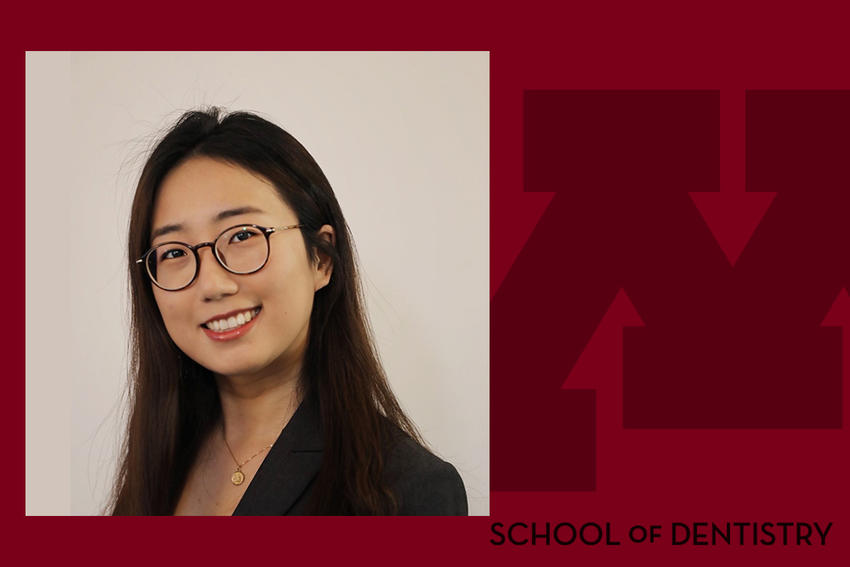Research, made personal

Qiman Gao, BDS, MSc, PhD, has had a lot of careers already in her life. She’s been a student, an oral surgeon, a researcher. Now, at the School of Dentistry, Qiman has found her place—a path where she can combine her passions and have a real impact on her patients.
Qiman’s career began in China, where she pursued a BDS and a Master of Science in Oral Surgery. She enjoyed that path for a while, but soon felt unfulfilled. “I got burnt out,” she recalled. “I felt like a tooth extraction machine. I wasn’t growing, and I wasn’t communicating with the patients.”
So, Qiman decided to try out a different path, pursuing a PhD in craniofacial health science. She enjoyed the pursuit of new knowledge and began to study chronic pain. When it came time to decide what to do after her PhD, Qiman debated between a postdoctoral fellowship and a clinical pathway. While she loved clinical work, she wasn’t ready to give up on her research skills,either. With the help of excellent mentors, and guided by her own experience with orofacial pain, she found her way to the School of Dentistry.
As a resident in TMD and orofacial pain, Qiman could pursue both of her beloved paths: impacting patients first-hand, while also seeking out discoveries that make their lives better. “My favorite part of orofacial pain is the patient interaction,” she explained. “You really have to listen to your patients, to understand their history and any contributing factors—so you’re really connecting with them.”
She also appreciates the interdisciplinary nature of the field. “As a dentist, you can refer to other specialties, but you’re typically working with other dentists,” Qiman said. “In TMD, we communicate with physicians, psychologists, neuroscientists and more. My knowledge in surgery, medicine, dentistry and chronic pain are all useful every day.”
In addition to the work she does with patients, Qiman is able to dive into research. She is currently involved with two major projects. The first, which received an American Academy of Orofacial Pain grant in 2022, was inherited from a previous resident. Qiman is working to explore the comorbidity between Trigeminal Neuralgia (TN), an episodic chronic pain disorder, and TMD. Because patients are often diagnosed with TN instead of TMD—and because Qiman suspects that the two disorders often coincide—she and her team are exploring the prevalence and correlation of the two disorders.
“I hope the project’s results will be a wake-up call for neurosurgeons and neurologists,” Qiman explained. “I want them to understand that many of their patients could have TMD, and they can take a simple two-minute screening and find out.”
Qiman’s second project, still in its infancy, was the result of a happy hour chat. After hearing about a study from an expert in anesthesia who explored the epigenetic expressions of patients with lower back pain, she thought, “why couldn’t we do that for orofacial pain?”
Qiman will explore the expression of DNA in those with and without TMD, examining how a high-stress environment contributes to differences in that expression. If successful, the possibilities are endless: saliva test kits could be used to diagnose TMD and orofacial pain for those without easy access to a provider, and studying changes in results could help measure the progress of treatment.
“Orofacial pain is subjective, and we don’t have an objective way to evaluate if a patient is improving,” Qiman explained. “There is a real gap here, and it’s exciting to think that we might be able to fill it.”
Qiman’s project is in the pilot stage, and she hopes to apply for grants and implement a larger clinical trial soon.
Qiman is thrilled with the way she has been able to combine her passions in these projects and at the School of Dentistry so far, and believes she’s found her path forward for the future.
“I want to be a clinician scientist,” she explained. “I can be a good clinician and do twenty to thirty extractions a day, but that alone is not meaningful for me. I can be a good researcher, but without understanding my patients’ needs, that research is not meaningful to me. There is a big gap in translational research, and I want to fill it. I want to help my patients with the knowledge, training and experience I have.”